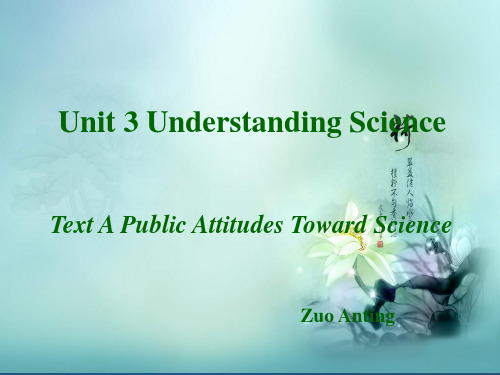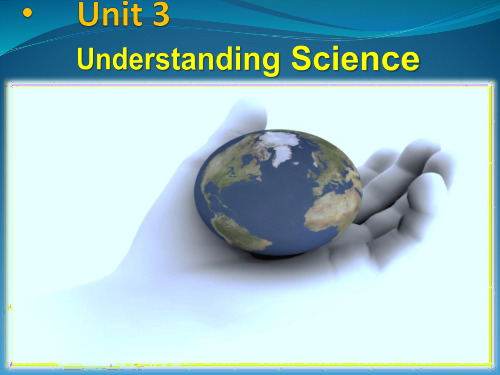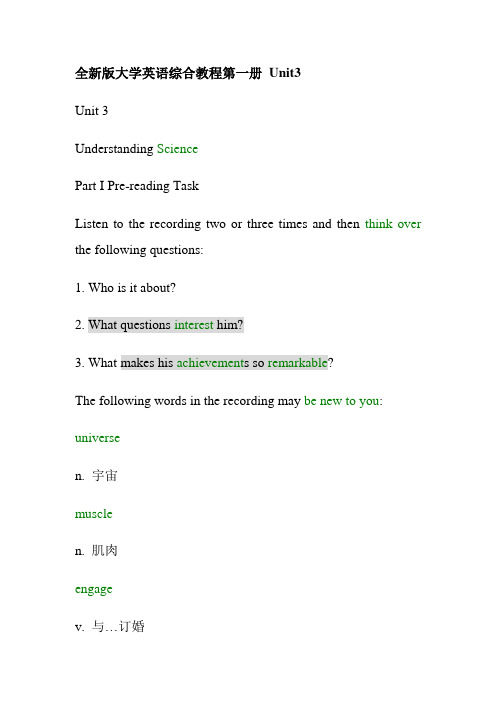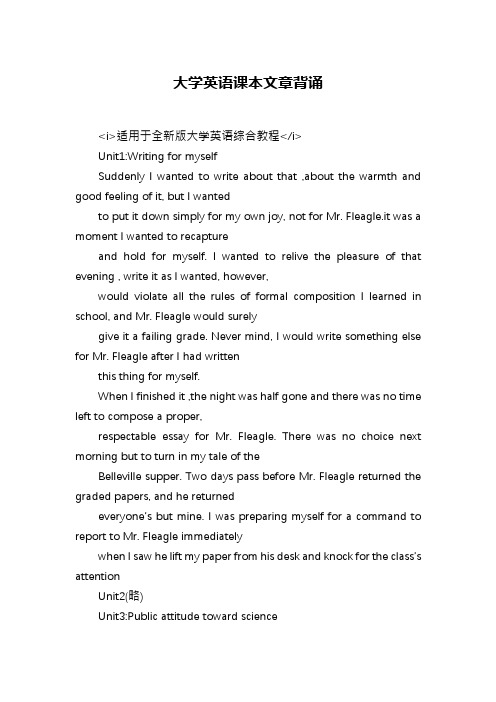Unit Public Attitude Toward Science
- 格式:pptx
- 大小:5.74 MB
- 文档页数:132





全新版大学英语综合教程第一册Unit3Unit 3Understanding SciencePart I Pre-reading TaskListen to the recording two or three times and then think over the following questions:1. Who is it about?2. What questions interest him?3. What makes his achievement s so remarkable?The following words in the recording may be new to you: universen. 宇宙musclen. 肌肉engagev. 与…订婚Part IIText AProfessor Hawking thinks it important to keep everybody in touch with what science is about. In this article he explains why.PUBLIC ATTITUDE S TOWARD SCIENCEWhether we like it or not, the world we live in has changed a great deal in the last hundred years, and it is likely to change even more in the next hundred. Some people would like to stopthese changes and go back to what they see aswonderful. It was not so bad for a privileged minority, though even they had to do without modern medicine, and childbirth was highly risky for women. But for the vast majority of the population, life was nasty, brutish, and short.AnywayKnowledge and technique sNor can one prevent further advance s in the future. Even if all government money for research were cut off (and thepresent government is doing its bestwould still bring about advance s in technology. Moreover, onewhether or not they are paid for it. The only way to prevent further development s would be a global state that suppresse d anything new, and human initiative and inventiveness are suchthat even this wouldn't succeedIf we accept that we cannot prevent science and technology from changing our world, we can at least try to ensure that the changes they make are in the right direction s. In a democratic society, this mean s that the public need s to have a basic understanding of science, so that it can make informed decision s(有根据的决定)s. Atthe moment, the public is in two minds about science.it also distrust s science because it doesn't understand it. This distrust is evident in the cartoon figure of the mad scientist working in his laboratory to produce aBut the public also has a great interest in science, particularly astronomy, as is shown by the largeaudience s for television series such as The Sky at Night and for science fiction.What can be done to harness this interest and give the public the scientific background it needs to make informed decision s on subject s like acid rain, the greenhouse effect, nuclear weapon s, and genetic engineering? Clearly, the basis must lie in what is taught in schools. But in schools science is often present ed in a dry and uninteresting manner. Children learn it by rote to pass examination s, and they don't see its relevance to the world around them. Moreover, science is often taught in terms of equation s. Although equations are a brief and accurate way of describing mathematical idea s, they frighten most people. When I wrote a popular book recently, I was advise d that each equation I include d would halve the sale s. I included one equation, Einstein's famous equation, E=mc2. Maybe I would have sold twice as many copies without it.Scientists and engineer s tend to express their idea s in the form of equations because they need to know the precise value s of quantities. But for the rest of us, a qualitative grasp of scientific concept s is sufficient, and this can be convey ed by words and diagram s, without the use of equations.The science people learn in school can provide the basic framework. But the rate of scientific progress is now so rapid that there are always new development s that have occur red since one was at school or university. I never learned about molecular biology or transistor s at school, but genetic engineering and computers are two of the developments most likely to change the way we live in the future. Popular books and magazine article s about science can help to put across new developments, but even the most successful popular book is read by only a small proportion of the population. Only television can reach a truly mass audience. There are some very good science programme s on TV, but others present scientific wonder s simply as magic, without explaining them or showing how they fit into the framework of scientific ideas. Producer s of television science programmes should realize that they have a responsibility to educate the public, not just entertain it.The world today is filled with dangers, hence the sick joke that the reason we have not been contact ed by an alien civilization is that civilizations tend to destroy themselves when they reach our stage. But I have sufficient faith in the good sense of the public(812 words)New Words and Expression sattituden. 看法;态度likelya. probable 可能的ad. probably 可能privilegeda. having a special advantage有特权的privilegen. 特权minorityn. 少数do without没有…而设法对付过去highlyad. very 很,非常riskya. full of danger; full of the possibility of failure, loss, etc. 危险的;有风险的nastya. very unpleasant令人难受的brutisha. 野兽般的,野蛮的anywayad. (used to change the subject of a conversation or to support an idea or argument) anyhow不管怎么说put/turn the clock back倒退,开倒车cut offstop providing (sth.); remove (sth.) by cutting 切断,中断;切下,剪下competitionn. 竞争;比赛bring aboutmake (sth.) happen 引起,导致technologyn. 技术moreoverad. 而且,再者inquiringa. showing an interest in knowing about things 好问的,爱探索的inquirev. 询问globala. worldwide, of the whole earth 世界的,全球的suppress▲vt. keep from appearing 抑制;压制initiativen. 首创精神;主动inventivenessn. 发明才能,创造力slow downmake slower 减慢raten. 速度;比率ensurevt. make sure保证,确保democratica. 民主的informeda. 有知识的,了解情况的;明智的informvt. 告诉,通知expertn. 专家at the momentnow 此刻,目前in two minds犹豫不决;三心二意steadya. constant; firm平稳的;稳定的evidenta. clear, obvious明显的cartoonn. 漫画;动画片elementn. 成分;元素astronomy▲n. 天文学audiencen. 观众;听众;读者seriesn. 连续;系列;系列节目fictionn. 小说;虚构harnessvt. control and make use of驾驭;利用backgroundn. 背景acida., n. 酸(性的);酸味的(物质)greenhousen. 温室nucleara. 原子核的;核心的weaponn. 武器genetic▲a. 基因的;遗传(学)的engineeringn. 工程;工程学basisn. 基础lie inexist or be found in在于roten. 死记硬背learn by rote死记硬背地学习relevancen. 相关,关联in terms of从…方面(或角度)来说;按照,根据equationn. 等式,方程(式)briefa. short; quick简洁的;短暂的accuratea. exact准确的,精确的mathematicala. 数学的halvevt. 将…减半tendvi. be likely to happen or have a particular characteristic or effect倾向,趋向in the form ofhaving the shape of; exist ing in a particular form 呈…的形状;以…形式precisea. exact 精确的qualitativea. 定性的;性质上的graspn. understanding掌握,了解conceptn. 概念sufficienta. as much as is needed, enough 充分的,足够的conveyvt. make (ideas, feelings, etc.) known to another 传达;表达diagramn. 图表;图解frameworkn. 框架;结构moleculara. 分子的biologyn. 生物学transistorn. 晶体管;晶体管收音机put acrosscause to be understood 解释清楚,使被理解proportionn. 比例;部分trulyad. 真正地;确实地magicn. 魔术;魔力fit intobe part of a situation, system, etc.;be part of a group of people or things 适合;符合;属于responsibilityn. 责任educatevt. teach or train教育entertainvt. give pleasure to; have(邀请,接待) as a guest给…以欢乐;招待hencead. as a result, therefore; from this time因此;从此contactvt. get in touch with与…接触alien▲a. foreign; strange外国的;陌生的civilizationn. 文明Proper NamesStephen Hawking斯蒂芬·霍金Einstein爱因斯坦(1879—1955,美籍德国理论物理学家)。

大学英语课本文章背诵<i>适用于全新版大学英语综合教程</i>Unit1:Writing for myselfSuddenly I wanted to write about that ,about the warmth and good feeling of it, but I wantedto put it down simply for my own joy, not for Mr. Fleagle.it was a moment I wanted to recaptureand hold for myself. I wanted to relive the pleasure of that evening , write it as I wanted, however,would violate all the rules of formal composition I learned in school, and Mr. Fleagle would surelygive it a failing grade. Never mind, I would write something else for Mr. Fleagle after I had writtenthis thing for myself.When I finished it ,the night was half gone and there was no time left to compose a proper,respectable essay for Mr. Fleagle. There was no choice next morning but to turn in my tale of theBelleville supper. Two days pass before Mr. Fleagle returned the graded papers, and he returnedeveryone’s but mine. I was preparing myself for a command to report to Mr. Fleagle immediatelywhen I saw he lift my paper from his desk and knock for the class’s attentionUnit2(略)Unit3:Public attitude toward scienceWhether we like it or not, the world we live in has changed a great deal in the last hundredyeas, and it I likely to change in the next hundred. Some people would like to stop these changesand go back to what they see as a purer and simpler age. But as history show, the past was notthat wonderful. It is not to bad for a privileged minority, though even they had to do withoutmodern medicine, and childbirth was highly risky for women. But for the vast majority of thepopulation, life was nasty ,brutish and short.Anyway, eve n if one wanted to ,no can’t put the clock back to an earlier age. Knowledge andtechniques can’t be just forgotten. Nor can one prevent further advances in the future. Even if allgovernment money for research were cut off(and the present government is doing it best), theforce of competition would still bring about advances in technology. Moreover, one cannot stopinquiring mind from thinking about basic science ,whether they are paid for it. The only way toprevent further developments would be a global state that suppressed anything new, and humaninitiative and inventiveness are such that even this wouldn’t succeed. All it would do is slow therate of change.Unit4:The American DreamAfter he pass away ,I thought more and more about Tony’s career. He grew in stature in mymind . In the end , I think he stood as tall, and as proud, as the greatest American industrialist.They are reached their success by the same route and by the same values and principal: vision,determination , self-control, optimism, self-respect and ,above all, integrityTony did not begin from the bottom rung of the ladder, he began in the basement. Tony ‘s affairwere tiny, the American industrialist’s affair were giant,. But ,a fter all, the balance sheets wereexactly the same. The only differences was where you put the decimal point.Tony Trivisonno came to America seeking the American Dream, but he didn’t find it .---hecreated for himself,. All he had were 24 precious hours a day, and he wasted none of them.Unit5:The company manAt the funeral, the sixty-year-old company president told the forty-year- old widow that thefifty-one-year old deceased had meant much to the company and would be missed and would behard to replace. The widow didn’t look him in the eye. She was afraid he would read herbitterness and, after all, she would need him to straighten out the finances--- the stock optionsand all that.。
Teenage Attitudes Towards Science As a teenager, attitudes towards science can vary greatly among individuals. Some teenagers may have a strong interest and passion for science, while others may find it boring or intimidating. There are several factors that can influence a teenager's attitude towards science, including their experiences with science education, their personal interests and hobbies, and societal influences. For many teenagers, their attitudes towards science are shaped by their experiences in school. Science classes can vary in quality and engagement, with some students finding them exciting and hands-on, while others may find them dull and difficult to understand. Teachers play a crucial role in fostering a positive attitude towards science, as they can inspire students with engaging lessons and real-world applications of scientific concepts. On the other hand, a lack of resources or support for science education can lead to disinterest or even aversion towards the subject. Personal interests and hobbies can also play a significant role in shaping a teenager's attitude towards science. For example, a teenager who enjoys building and tinkering with electronics may have a natural inclination towards physics and engineering. Likewise, a teenager who loves animals and nature may be drawn to biology and environmental science. Encouraging teenagers to explore their interests and make connections between their hobbies and scientific concepts can help foster a positive attitude towards science. Societal influences, such as media portrayals of scientists and the perception of science as a difficult or elitist field, can also impact a teenager's attitude towards science. Many teenagers may have preconceived notions about what it means to be a scientist, based on stereotypes and misconceptions perpetuated in movies and TV shows. Breaking down these barriers and showcasing the diverse and exciting opportunities in the field of science can help change perceptions and inspire more teenagers to pursue a career in STEM. It is important for educators and parents to support and encourage teenagers in their exploration of science, regardless of their initial attitudes towards the subject. Providing access to hands-on experiments, mentorship opportunities, and exposure to diverse role models in the field of science can help teenagers see the relevance and impact of science in theireveryday lives. By fostering a positive and inclusive environment for learning, we can help teenagers develop a lifelong love and appreciation for science.。
Public attitudes to technology and itsimpact on the futureA threat or opportunity?Generally, UK adults are positive about the benefits that technology can provide to our society. Half (50%)†of UK adults are optimistic about technology, viewing it as more of an opportunity than threat to our economy and society. However, one in ten (10%) perceive technology to be more of a threat.In terms of threats to jobs, only a third (35%) think that their current job is at risk from future developments in artificial intelligence and automation, although this rises to half (49%) of Londoners.Despite many perceiving technology as an opportunity, many are also concerned about the negative consequences of technology. The majority are concerned about cyber crime (86%), online abuse (70%), extremist groups using digital platforms (89%) and fake news online (67%).The management of technological challengesThe public largely feel that politicians are not taking sufficient action toaddress the challenges and risks of the next wave of technological change (69%). They also feel that technology companies are failing to handle the challenges, with three in four (76%) saying that they do not think†technology companies are devoting sufficient resources to remove extremist content from their platforms.Trust with handling personal dataFurther to this, UK adults do not feel comfortable with sharing their personal information with social media companies. 60% are comfortable sharing personal information with government departments/organisations while only 11% are comfortable with sharing this information with social media organisations.Sacrifices to improve policing of online contentPerhaps surprisingly, UK adults are willing to put up with personal inconveniences if this would lead to better policing of online content. 90% of UK adults who think technology companies have a responsibility to police their content, are willing to wait 3 minutes on average to send or post a†message if it meant that these technology companies were better able to police online content.Public Views on TechnologyFutures introductionOver the last year or so, the relationship between politics and technology has moved from a niche area of interest to tech people like me, into a major public debate that concerns everyone. New and difficult questions have arisen about how society should best police content online while maintaining free speech; how to deal with internet trolls and bots (especially during elections); how to ensure more people can benefit from technological change without harming growth; or how we deal with the growth of powerful artificial intelligence.If there were easy answers to these questions, we would not discuss them with such regularity. But these issues – which are fundamentally political in nature as well as technological – mostly play out in newspapers or political debates. What’s lacking is input from the public,which is a shame because any approach taken should be informed by what people actually think.our surveyIn partnership with Opinium, we conducted some new research examining public opinion, polling 2,000 British adults on the big questions relating to technology. So what is the general public attitude toward tech? I would summarise it as ‘concerned optimism’: generally upbeat and positive, but keen for both Government and tech firms to do more to mitigate any socially harmful consequences.While there has been a recent wave of negative media about technology in recent months (which some writers have dubbed the‘techlash’), 50 per cent of Brits are optimistic about technology and the benefits it could bring our society and economy, while only one in 10 see it as more of a threat than an opportunity. This optimism is most pronounced in London, where nearly two-thirds are optimistic (64 per cent).technology's harmful consequencesAnd while there has been a slew of recent interest in the risks of Artificial Intelligence (AI) and automation to people’s jobs, only 35 per cent of Brits feel their job is at risk from this next wave of technological innovation. Again, London stands out – although this time for its consternation, where roughly half are worried about the risks posed to their vocations. It is interesting that London is simultaneously the most optimistic about technology in general, and yet most fearful about its impacts on their own jobs. I’d hazard a guess that most Londoners probably think their current occupation might be at risk – but also that the technology revolution will create plenty more jobs in the years ahead.Nonetheless, in spite of their broad optimism, the public are clearly worried about the socially harmful consequences of technology. Overall, our survey finds that British adults share a range of concerns, including extremism (89 per cent), cybercrime (86 per cent), online abuse (70 per cent) and fake news (67 per cent) – with Brits over 55 more likely to express concerns about these issues than the younger generations. Morethan half of Brits (54 per cent) believe technological benefits will not be shared evenly across society.responding to challengesAll technology creates both new opportunities and new challenges. Perhaps the more interesting question is who is responsible for dealing with these problems. The survey finds that citizens believe both the Government and technology companies should do more to protect society from these harmful consequences and mitigate future risks from the next wave of technological revolution.Over two-thirds (69 per cent) are concerned that MPs aren’t taking sufficient action to safeguard against the challenges of the next wave of technological change. Given the recent Budget hinted at the UK Government investing more in new technology – notably driverless cars, but artificial intelligence more generally as well –more effort might be put into planning for any negative consequences of these advances.Similarly, 76 per cent do not believe that technology companies are devoting enough resources to removing extremist content from their platforms. In particular, social media companies are not trusted when it comes to handling people’s personal information. While 60 per cent of the public are comfortable with sharing personal information with the Government, only 11 per cent are comfortable with sharing similar information with social media. Tech firms have a major trust deficit which they need to address, especially given a growing volume of personal information is likely to be created in the future.trade-offs and interventionsThe public seems to accept that trade-offs need to be made: that any effort to tackle these problems might entail greater intervention from both Government and private industry. They seem willing to bear them too: the public are amenable to sacrificing civil liberties to protect social harm (32 per cent are in favour of a safety-first approach, compared to 23 per cent in favour of protecting civil liberties).Perhaps even more surprisingly, of the 90 per cent of Brits who think technology companies have a responsibility to police their content, there is a willingness to wait more than three minutes on average to send a text message, in exchange for stricter regulation. Only 19 per cent of Brits feel that over-regulation of technology would damage Britain’s economy.generational and gender dividesThere is a slight generational (and in some cases geographic or gender) divide in respect to some of these attitudes. For example, young Brits are more inclined to favour protecting civil liberties and freedom of speech (34 per cent) than the older generations (14 per cent). Similarly, young people are consistently more optimistic and less cautious about technology’s future impacts – more than twice as likely (25 per cent vs.11 per cent) than over-55s to believe its benefits will be shared evenly across society.Women are more cautious about seeing technological innovation as an opportunity (44 per cent women vs. 56 per cent of men). People living in Scotland were found to be consistently more pessimistic compared to other regions; and people who voted to leave the European Union were more likely to view technology as a threat to British society than Remain votersconclusionWe are living through exciting and somewhat terrifying times. It is encouraging that so many people remain positive about the role technology will play in society. To maintain that enthusiasm, it is important that both technology firms and Government do more – and are seen to be doing more – to smooth over the inevitable challenges that fast-paced change always creates. Otherwise, these concerns might be translated into hostility, and the benefits of the tech revolution could be lost to everyone.methodological notesThe full data tables for this research can be downloaded here.Demos is working to facilitate greater education and understanding of the risks and opportunities of technology, and technology regulation, through our Technology Education Project.Fieldwork for this project was conducted by Opinium Research between 06 to 09 October 2017.Online interviews were filled in by 2,003 UK adults.This project was conducted to support to launch of the special Technology issue of the Demos Quarterly journal.。